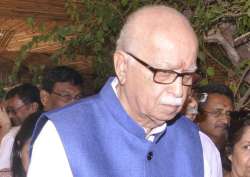Babri case: Court to frame additional charges against LK Advani on May 26
The special court will frame the charges after the accused appear before it in person, CBI counsel Lalit Singh said.

A special CBI court hearing the 1992 Babri Masjid demolition cases is likely to frame additional charges on May 26 against LK Advani and other BJP leaders, following the Supreme Court order restoring the serious criminal conspiracy offence against them.
The special court will frame the charges after the accused appear before it in person, CBI counsel Lalit Singh said.
The court has fixed tomorrow for framing of charges in the other case in which Mahant Nritya Gopal Das, Mahant Ram Vilas Vedanti, Baikunth Lal Sharma alias Prem Ji, Champat Rai Bansal, Dharma Das and Satish Pradhan are accused, he said.
The court today granted bail to Pradhan, a former Shiv Sena MP, after he surrendered here.
Special CBI court judge SK Yadav granted him bail on two sureties of Rs 20,000 each and a personal bond of the same amount. The other five accused had been granted bail on Saturday by the special court, which began day-to-day hearing in the politically sensitive case on May 20 after a Supreme Court direction.
After demolition of Babri Masjid in Ayodhya on December 6, 1992, two FIRs were registered in connection with the incident.
While the case of 28 accused was taken up in Lucknow CBI court, six of them died. Advani and seven other were chargesheeeted in Raebareli court. Two of them - VHP leaders Ashok Singhal and Giriraj Kishore - died pending trial.
The Supreme Court had on April 19 directed that former deputy prime minister Advani, Union Minister Uma Bharti and BJP veteran Murli Manohar Joshi will face trial on conspiracy charges. It had also transferred their case from Raebareli to Lucknow.
Besides the BJP three leaders, the conspiracy charge would now be invoked against Vinay Katiar, Sadhvi Ritambara and Vishnu Hari Dalmia, who were being tried at Raebareli.
It directed the special court to start proceedings in the matter within a month and deliver its verdict within two years.
The apex court had dubbed the demolition of the medieval era monument as a "crime" which shook the "secular fabric of the Constitution" and allowed CBI's plea on restoration of serious offence of criminal conspiracy against the VVIP accused.
In its 40-page judgement, it had termed the Allahabad High Court's February 12, 2001 verdict dropping conspiracy charge against Advani and others as "erroneous".
The matter is likely to have political implications, particularly against 89-year old Advani, reported to be a front-runner for the post of the President.
The apex court had also come down heavily on the CBI for the delay of 25 years in the trial.
It said "the accused persons have not been brought to book largely because of the conduct of the CBI in not pursuing the prosecution of the aforesaid alleged offenders in a joint trial, and because of technical defects which were easily curable, but which were not cured by the state government."
While a charge sheet in the Lucknow court was filed in October 1993, a supplementary charge sheet was filed in November 1996. A supplementary charge sheet was also filed in May 2003 in Rae Bareli court.
Issuing a slew of directions, the apex court had said the proceedings in the case against Advani and five others in the court of the special judicial magistrate at Raebareli will be transferred to the court of additional sessions judge (Ayodhya Matters) at Lucknow.
It had said additional charges will be framed under Section 120-B (conspiracy) and the other provisions of the penal code mentioned in the joint charge sheet filed by the CBI against the accused.
The apex court had directed the Lucknow court to take on a day-to-day basis the hearing of the case after transfer of the proceedings from Raebareli and framing of additional charges.
The trial will be taken from the stage at which they were both at Raebareli and Lucknow, it had said.
There shall be no fresh trial. There shall be no transfer of the judge conducting the trial until the entire trial concludes. The case shall not be adjourned on any ground except when the sessions court finds it impossible to carry on the trial for that particular date, it had said.